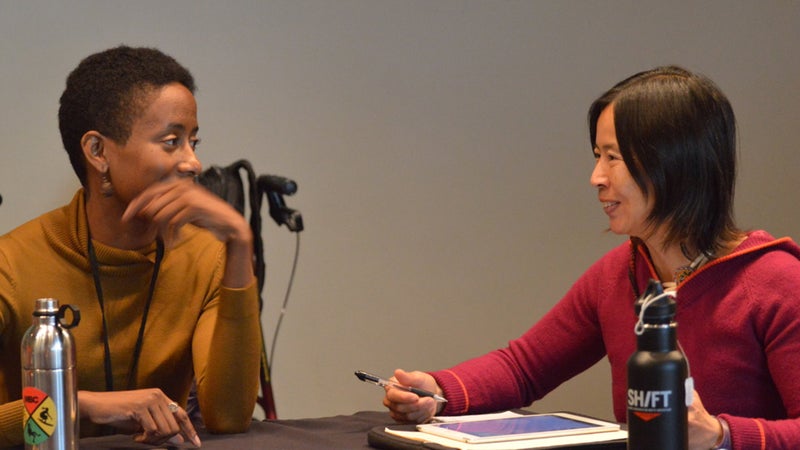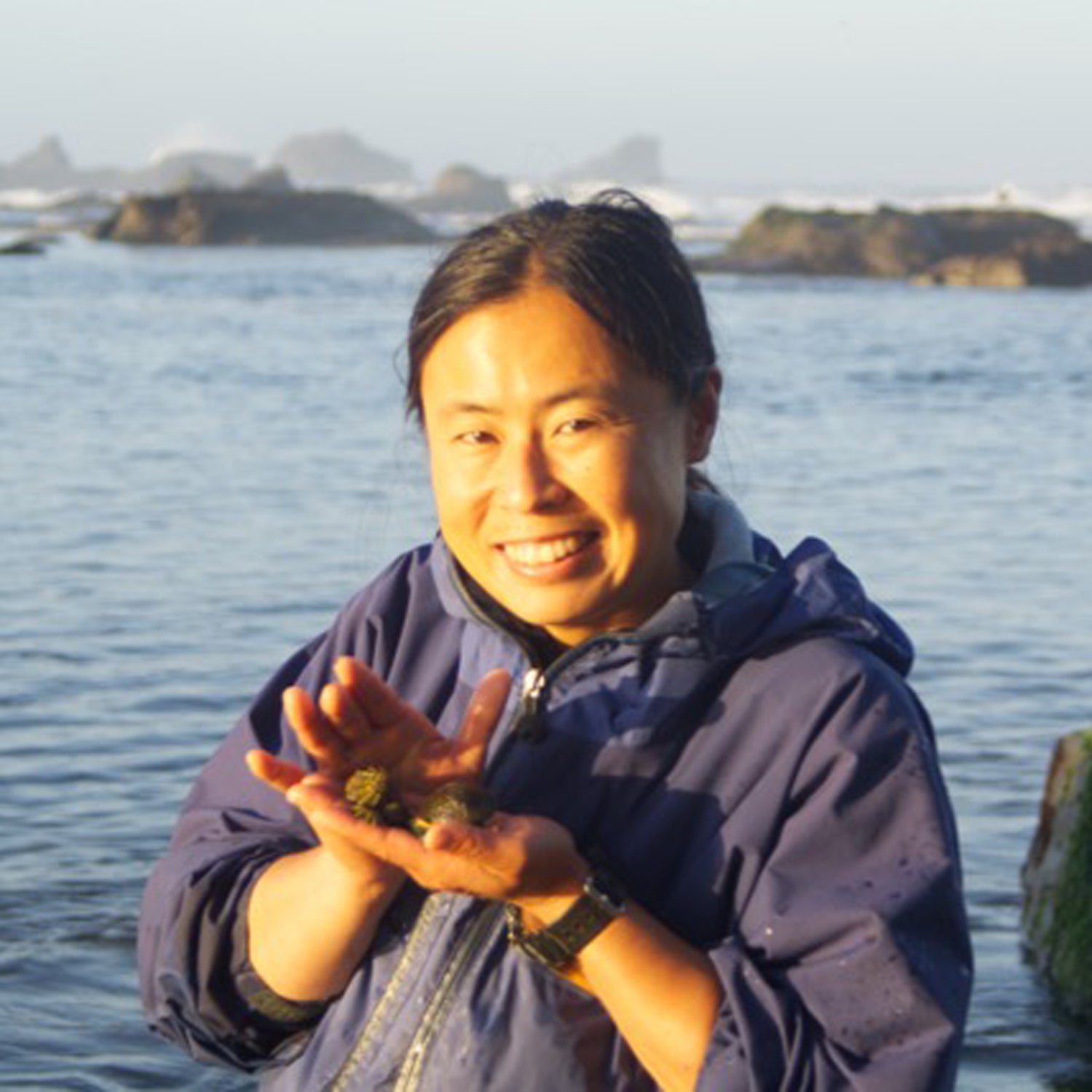Miho Aida had a Flip camera and zero filmmaking experience when she traveled to the southern edge of the Arctic National Wildlife Refuge (ANWR) and made the documentary that put her on the map in the outdoor industry.
It was July 2010 when the arrived at Arctic Village, a town of approximately 150 people in northeastern Alaska. It was one of the most remote places she’d ever been. Aida was working on a media project to document the role of Native American women activists in preserving public lands. She was there to meet Sarah James, an elder within the Gwich’in Nation, and hear James’ stories of her people’s to protect ANWR’s wild lands from oil and gas drilling.
The battle over the 19 million-acre refuge has raged off and on since it was first protected in the 1960s. Last December, Congress voted to reopen ANWR to drilling, stoking the debate. But most of the discussion is focused on the environmental impact and threat to wildlife like polar bears and migratory birds. Far less often recognized are the indigenous people like the Gwich’in, who have lived in the Arctic for thousands of years. Aida wanted to elevate their voices in the fight.
For the Gwich’in, preservation of this area is an issue of human rights, sovereignty, and food security. They call the coastal plain of ANWR “the sacred place where life begins” because it’s the birthing and nursing grounds of the porcupine caribou herd, which the Gwich’in rely on for food, clothing, tools, and spiritual guidance.
After filming, when Aida returned home to the San Francisco Bay Area, she had more than eight hours of footage, mostly interviews with Gwich’in women about the cultural and environmental importance of ANWR. She transformed the video into a short documentary film, .

Since the film’s release, in 2013, it has won awards at the 2014 Earth Port Film Festival and the 2015 Central Illinois Feminist Film Festival and was nominated for best documentary short at the 2013 American Indian Film Festival. In November, Aida was awarded the 2017 ���ϳԹ��� Athlete of the Year award, recognizing her unique way of blending outdoor adventure with conversation work.
In its wake, Aida has emerged as an outspoken advocate for ANWR and a champion for inclusivity—particularly for women of color. Her decade of work has finally found its time and has taken on new importance.
Born and raised in Tokyo, Aida has always found respite in nature. Her fascination with public lands began in high school in Japan, thanks to a BBC TV special on the U.S. national parks system.
She went on to study environmental science, earning her masters degrees from Hokkaido University. In 1999, she left Japan to attend Teton Science School in Jackson Hole, Wyoming, to study environmental education. After graduating, Aida moved to the San Francisco Bay Area to begin working for , a nonprofit organization that provides hands-on environmental science education for youth in partnership with the National Park Service, where she’s worked ever since. She’s also a climber, wilderness guide, and former NOLS instructor.
But Aida says her commitment to social justice and conservation is really rooted in her name.
The first character of her name, 民 or “Mi,” means people. It’s also a character used to describe democracy. “My parents wished [for] me to become a leader who demands greater democracy,” Aida says, one who listens and is kind.
The second character, 穂 or “Ho,” means rice bud. Rice is a symbol of Japanese culture that’s linked to the land. “We are rice people, and the rice field is where [my parents] saw co-existence of humans and nature,” she says.
For the Gwich’in, preservation of this area is an issue of human rights, sovereignty, and food security.
Together, Aida’s name means a protector of people, culture, and environment. Her birthday, August 26, also happens to be �´dz����’s Equality Day, commemorating the day women were granted the right to vote. “I feel like I’m meant to do this work, or I was born in this world with a purpose already,” Aida says.
Conservation and environmental work remains dominated by white males. “For the longest time, conservation issues were seen as a white man’s hiking club,” accessible only to some, says Alli Harvey, Alaska campaign representative for the . As the fight for public lands heats up, there’s greater recognition that diversity and inclusion matter. “America’s demographics are evolving, and if we want to give ourselves the best chance of protecting public lands and waters for perpetuity, we need to do the work now to include all Americans in the conversation, not just those of us with the historic privilege and power to dominate that conversation,” says Chris Perkins, marketing coordinator for SHIFT.
But it hasn’t always been easy for Aida to embrace her own identity. “[Living in Japan], I had a lot of privilege I didn’t even think about. Moving to the U.S., I struggled as an English language learner and immigrant,” she says. “I just wanted to be white. I wanted to blend in.” She started mimicking the habits of her white colleagues, wearing Patagonia and drinking from Nalgene water bottles. She even tried to get rid of her accent.
Aida felt invisible. She came to the United States believing that if you work hard, you can achieve anything. However, as a non-U.S. citizen, she wasn’t eligible to achieve her dream to be a National Park Service ranger, no matter how hard she worked. She also noticed the lack of role models for women of color in the outdoor industry. Without faces that looked like hers, Aida began to wonder if she had any place in the outdoor and conservation world.
So, in 2008, she created “If She Can Do It, You Can Too,” a media project to document and promote the stories of diverse women involved in environmental conservation, science, and adventure sports. “[The project] came out the idea that we need to see somebody who looks, sounds, and lives like us in the media so we know that we can do that, too,” she says. Aida posted photographs and short video clips on her website, but the project has largely flown under the radar.
She eventually pivoted to spotlight women from marginalized communities involved in environmental and social justice work against the backdrop of the outdoors. In 2010, Aida turned her focus to native and indigenous women who are stewards and fierce protectors of public lands, which brought her to Sarah James and the Gwich’in women.
“The thing Miho does so well is let the voices of the people whose lives would be most directly impacted by any development in the coastal plains speak for themselves,” Harvey says of Aida’s documentary.
While Aida never expected her film to be political, it has become a powerful advocacy tool for ANWR. She’s screened the film for congressional staff members on Capitol Hill, and she’s embarked on three bike film tours. In 2014, Aida rode her bike 1,000 miles from Seattle to San Francisco and, in 2015, another 1,000 miles from D.C. to Bar Harbor, Maine. During the summer of 2017, she rode about 300 miles around Maine to garner support for ANWR from residents and Senator Susan Collins.
“It goes back to ‘If She Can Do It, You Can Too.’ It’s so important to see ourselves and experiences mirrored in these people, because otherwise we’ll never think it’s possible.”
“If you consider her demographically as an Asian-American female, it doesn’t necessarily suggest that she would have a voice in the conversation, but she’s never let that identity dictate her potential,” Perkins says. “She’s shown this fearlessness and sense of self-efficacy, and all without major sponsorship.”
After receiving the SHIFT award, Aida sees her role evolving. She wants to serve as a bridge between communities struggling to protect their human and environmental rights and athletes and outdoor adventurers who want to help. “What if [outdoor companies] had an environmental ambassador program where they sponsor folks who may not be typical athlete but use their athletic talents for environmental and social justice?” she says. “It goes back to ‘If She Can Do It, You Can Too.’ It’s so important to see ourselves and experiences mirrored in these people, because otherwise we’ll never think it’s possible.” The SHIFT award has given Aida the confidence to leverage her newfound recognition and continue to advocate for change in the outdoor industry.
Along with groups like , , and @brownpeoplecamping, Aida is bringing greater visibility to women and people of color in the outdoors—role models for others to follow. “When we don’t see ourselves, we think that it’s not for us. But it is for us. We need to be more visible in park uniforms and park images,” says Teresa Baker, founder of African American Nature and Parks Experience. “She’s asking why the outdoor industry doesn’t pay as much attention to women, especially women of color. She questions that.”
As a result, Aida empowers others to follow suit. “It’s vital that Miho continues to do the work of uplifting women,” Baker says.
The future of ANWR remains up in the air. Environmental advocates vow to fight the legislation opening up the refuge to oil drilling, and Aida will continue to be on the front lines, elevating the voices of the Gwich’in and other marginalized women in the outdoor world.
“We’re seeing so many companies put their money where their mouth is in terms of conversation work, and I think that should extend to athletes like Miho who don’t fit the typical narrative for outdoor companies and the athletes they showcase,” says Perkins. “These big companies need to invest in grassroots campaigns like Miho’s to enrich their conservation efforts.”


